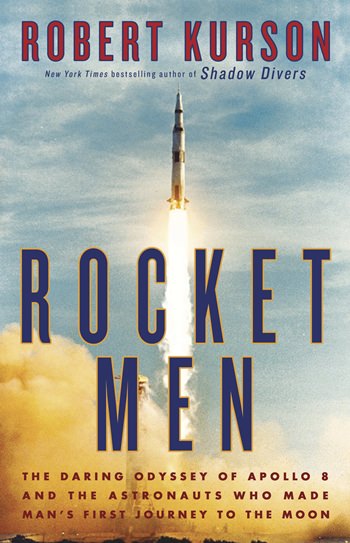
“Rocket Men” (Random House), by Robert Kurson
 The first astronauts to orbit the moon ended their 1968 Christmas Eve television broadcast with a personal message for the people of Earth.
The first astronauts to orbit the moon ended their 1968 Christmas Eve television broadcast with a personal message for the people of Earth.
No one knew what the three Apollo 8 astronauts would say — not their worried wives 240,000 miles away nor the buttoned-down NASA engineers who meticulously planned every moment of the high-stakes mission to reach the moon before the Soviets.
With the moon showing on TV screens, Bill Anders began reading: “In the beginning, God created the heaven and the Earth …” Then Jim Lovell and Frank Borman followed by reading a few lines each from the book of Genesis. The plain voices reading the Bible’s creation story made grown men weep, Kurson writes, and sent people outside to peer at the sky in wonder.
Sweet moments like this punctuate this mostly engrossing book about the historic but sometimes overlooked Apollo 8 mission. Neil Armstrong and company will always get top billing among astronauts for landing on the moon in 1969, but first someone had to show it was even possible to get there and back.
By 1968, the Soviets appeared poised to launch and deal Americans yet another in a series of space-related humiliations dating back to Sputnik. NASA was determined to get there first, even if it meant dramatically compressing the timeline.
Kurson’s conception-to-splashdown reporting had the cooperation from the astronauts and their wives, giving him invaluable details of what happened inside the astronaut’s capsule and in their homes below. Most readers already know how the mission turned out (success!), but Kurson builds suspense around a mind-bendingly complex and dangerous journey.
One NASA official explained that with Apollo 8’s 5.6 million parts and 1.5 million systems, even if the mission went 99.9 percent right, there would be 5,600 defects. Borman, Lovell and Anders knew full well there was a very real chance the tiny capsule could become their tomb.
Their wives knew it, too. Marilyn Lovell, Susan Borman and Valerie Anders shared all of their husbands’ anxiety and got almost none of their glory. Their fate was to keep brave faces for the press photographers and to wait to hear their husbands’ voices on the squawk boxes installed in their homes. Just in case, Susan Borman sat at her kitchen table to write her husband’s eulogy. The three women provide the most poignant moments in the book. (AP)





